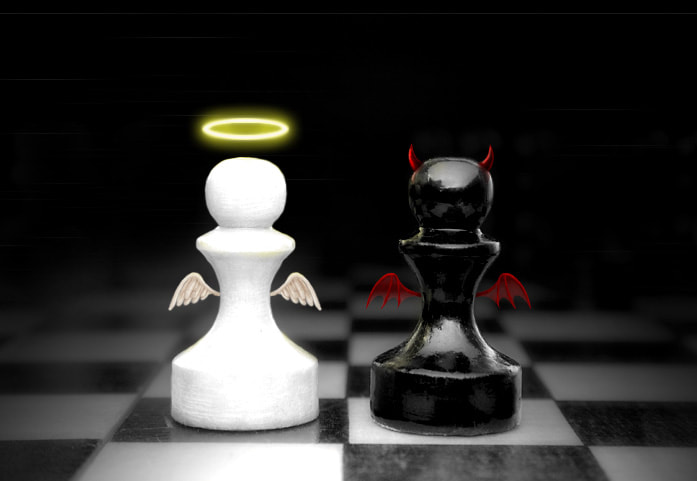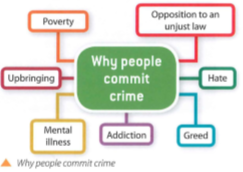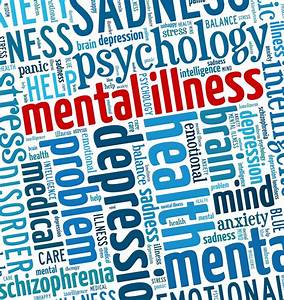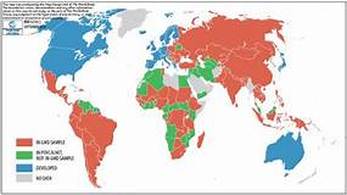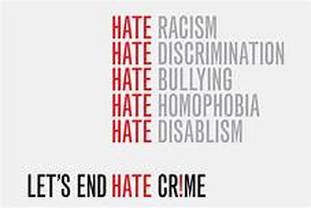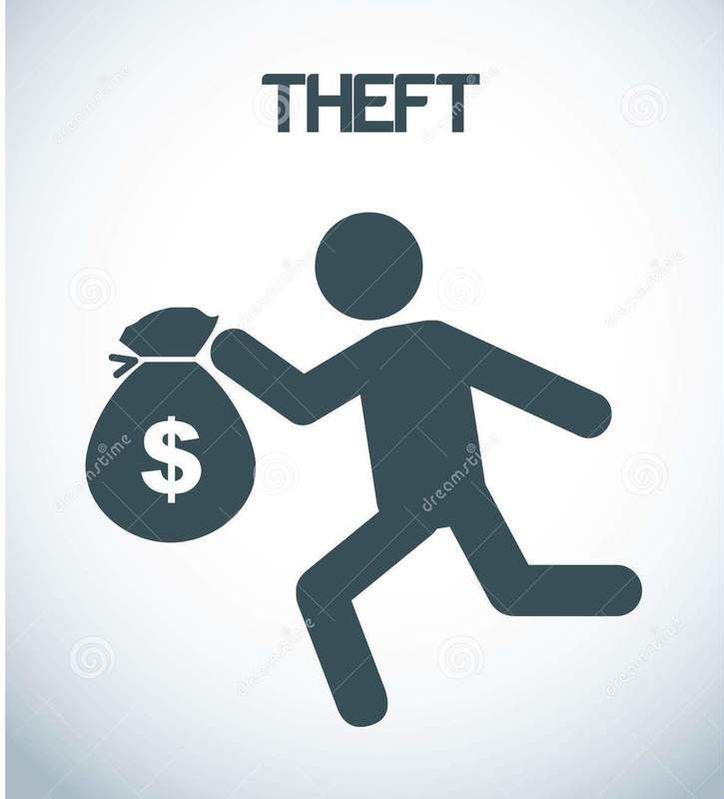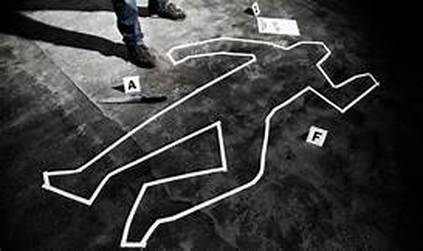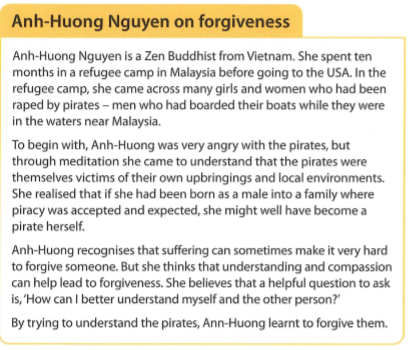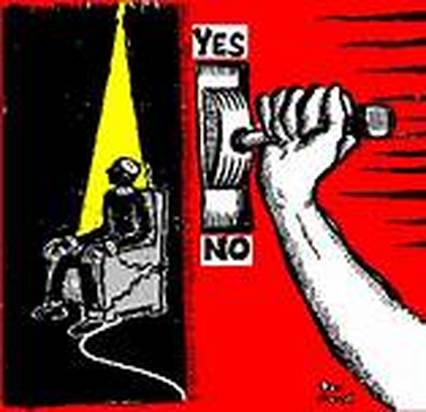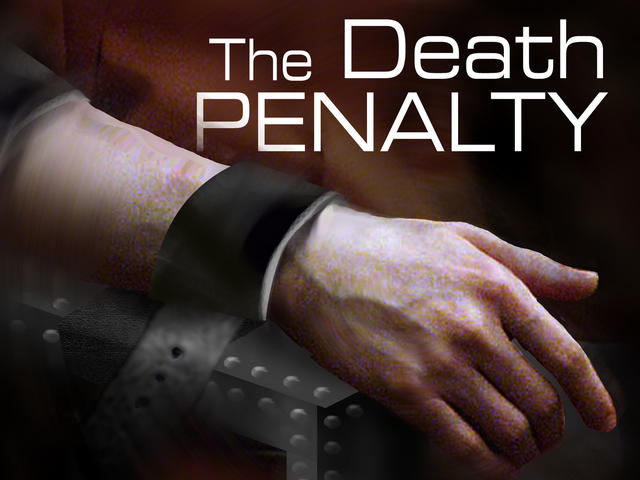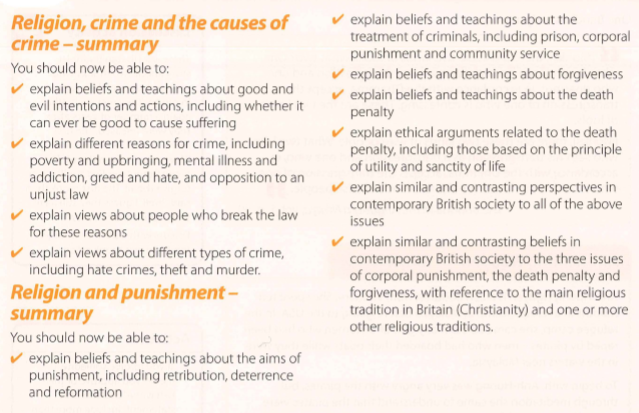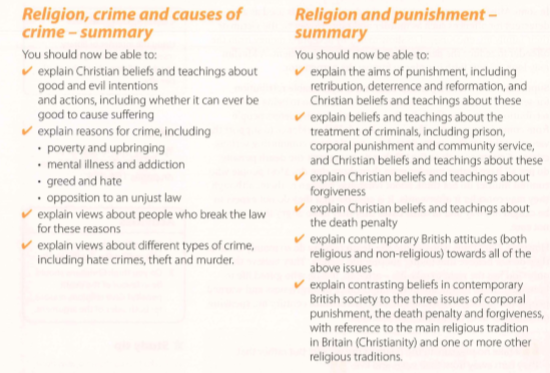|
|
|
Religion, Crime and Punishment.
A crime is any action which is against the law that has been put in place by the rulers of any state. In the UK, the government must get the approval of Parliament before any new crimes are written into law. The police arrest people who are suspected of having broken the law by committing crimes. If after questioning the police are confident they have got the right person, they charge them with having committed the offence.
Once charged of a serious crime in the UK, suspected offenders face a hearing in front of a local magistrate before being required to appear in a Crown Court before a judge and jury of 12 people, selected at random. Less serious cases are dealt with by a magistrates' court, while some more minor crimes result in the police giving the offender an official caution if they admit they are guilty.
Offenders who are found guilty by a court face a legal punishment. Most serious offences such as murder and rape carry a life sentence in prison, although this rarely means offenders spend the rest of their lives in prison. Less serious offences are punished with a shorter spell in prison, or with non-custodial sentences such as community service or a fine. If a court decides that the person has committed no crime, they are released without any punishment. Under no circumstances in the UK can a court impose a sentence intended to cause physical harm (corporal punishment) or death (capital punishment). However, in some countries, such as China, parts of the USA, and Saudi Arabia, the death penalty is permitted.
In no instance is an individual victim of a crime allowed to punish the offender. Such action is against the law and punishable by the law Civil law is different from criminal law. Civil law concerns disputes between private individuals or groups. This includes such matters as the settlement of a divorce, disputes between landlords and tenants and disputed wills. Cases are usually dealt with in a small claims court although in more serious cases, the case will be heard in Crown Court
Once charged of a serious crime in the UK, suspected offenders face a hearing in front of a local magistrate before being required to appear in a Crown Court before a judge and jury of 12 people, selected at random. Less serious cases are dealt with by a magistrates' court, while some more minor crimes result in the police giving the offender an official caution if they admit they are guilty.
Offenders who are found guilty by a court face a legal punishment. Most serious offences such as murder and rape carry a life sentence in prison, although this rarely means offenders spend the rest of their lives in prison. Less serious offences are punished with a shorter spell in prison, or with non-custodial sentences such as community service or a fine. If a court decides that the person has committed no crime, they are released without any punishment. Under no circumstances in the UK can a court impose a sentence intended to cause physical harm (corporal punishment) or death (capital punishment). However, in some countries, such as China, parts of the USA, and Saudi Arabia, the death penalty is permitted.
In no instance is an individual victim of a crime allowed to punish the offender. Such action is against the law and punishable by the law Civil law is different from criminal law. Civil law concerns disputes between private individuals or groups. This includes such matters as the settlement of a divorce, disputes between landlords and tenants and disputed wills. Cases are usually dealt with in a small claims court although in more serious cases, the case will be heard in Crown Court
Lesson One: Good and Evil actions.
|
The teachings in the Bible warn against having any evil or wrong thoughts and intentions:
"You have heard it was said to the people long ago,'You shall not murder: and anyone who murders will be subject to judgment. '' Matthew 5:21-22 [NIV] Many people would say that any action that obeys the law is a good action. However a good action also includes that which is good but not specified in the law, such as generosity and love. There is no law that dictates supporting charities, but offering support in some way to a good cause is usually considered to be a good thing. Likewise, many Christians believe that even though actions such as adultery are legal, they are still wrong. Actions encouraged or required by genuine religious faiths are considered to be good. Evil actions are those which cause suffering, injury or possibly death. These include murder, causing a terrorist explosion and child abuse, which are all illegal. Some actions could be considered evil even though they are not against the law. In a religious sense, evil can be linked with the devil (Satan) who is the source of all that is considered evil. However, when Christians speak about evil criminal actions, they usually mean that the offence is profoundly immoral and wicked rather than directly linked to the devil. Christianity generally considers crimes involving violence against people as sinful and against God. |
Buddhism tends not to speak in terms of 'good' and 'evil' but rather in terms of 'skilful' and 'unskilful' actions. A skilful action is rooted in generosity, kindness and understanding, whereas an unskilful action is rooted in selfishness, hatred and ignorance.
The principle of karma teaches that what is most important for Buddhists is the intention that drives an action. However, sometimes it is difficult for a person to know what their motives really are, and so a further way to understand if their actions are skilful or not is to work out whether their actions cause harm to themselves and/ or others. The five moral precepts can also be used to help identify unskilful and skilful actions. What counts as a crime is defined by the government of each country. There are many unskilful actions that are not crimes, and there may even be crimes that are not unskilful from a Buddhist perspective. For instance, it would be unskilful to lie but most lies are not considered crimes. Yet a lie could potentially cause much more suffering than a minor crime (such as trespassing). Generally, Buddhists believe that it is correct to follow the law, but that it is even more important to cultivate skilful actions and abandon unskilful ones. There might be some circumstances where Buddhists feel compelled to disregard or disobey a law that they consider to be unjust, but probably not in a violent way. For instance, if a law were made that said it was illegal to meditate, many Buddhists would feel justified in ignoring that law, even if it meant that they might be punished for doing so. They would consider it a matter of principle to resist a law that restricted spiritual development. |
Lesson Two: Reasons for crime.
|
There are many reasons why people commit crimes. These range from specific, immediate reasons- such a stealing someone's wallet to pay for a drug addiction -to more complex reasons to do with the way that society is structured, which affect, for example, people's upbringing and education. For Buddhists, while some actions that are considered crimes may arise from a skilful motive, such as defying a law that causes harm, crimes usually involve a lack of kindness or awareness of others. However, Buddhism recognises that various factors influence criminal activity, and that it is not simply a question of people being 'bad'. While Buddhism might condemn a crime, it would not condemn the criminal. Instead it would recognise that there were complex reasons and various outside influences that led the person to commit a crime. However, this does not mean that criminals are free of responsibility for their actions.
Upbringing
Growing up in a household where crime is a way of life may encourage a young person to follow the example of people they live with and drift into crime themselves. Even their parents may encourage them to commit crimes. Once they have been drawn into a life of crime, it is difficult for them to stop, even though they know that what they are doing is wrong. Mental illness Some people suffer from a mental illness that causes them to commit crimes. Kleptomania is a mental condition that makes some people steal. Anger management problems may lead to assault or murder. In cases involving serious crimes and serious mental illnesses, the offender may be viewed as unfit to stand trial. They are likely to be sentenced to be kept in a secure unit where they receive the treatment they need, even though they have not had an actual trial. Their legal representatives will work with the court authorities to ensure justice is done. According to Buddhism, everyone sees reality in a distorted way, which leads people to inflict suffering on themselves and others. Greed
In the UK personal possessions and wealth are seen as signs of status. Greed can lead to crime, especially theft or fraud. In the Ten Commandments, Christians are taught not to covet, which means they should not be jealous of what somebody else has, and envy is one of the seven deadly sins. Buddhism teaches that acting out of greed is unskilful and leads to suffering. Hate Hatred is a negative feeling or reaction. It can lead to violence or aggression towards whoever or whatever the offender hates. According to Buddhism, hatred is one of the three poisons and one of the main causes of suffering. Buddhists believe it is important not to feel hatred towards others, even when provoked. |
Poverty
It is a fact that in the UK, some people live in poverty and cannot afford the necessities of life. Welfare payments should cover living expenses but sometimes, for whatever reason, they do not. This can lead some people to steal food and essentials that they cannot afford to buy. Even though this may seem to be a good reason, it is still against the law and people will still be arrested for stealing. While Christians condemn stealing they are keen to make sure that nobody is so poor that they use poverty as an excuse for stealing. In June 2015, Pope Francis said: '' Focusing on poverty and sacrificing for the poor are the heart of the gospel. If Christians don't dig deep and generously open up their wallets, they do not have genuine faith." Pope Francis Digha Nikaya indicates that if people do not have basic necessities, crime is likely to follow. While breaking the law for such reasons is understandable, it is still likely to cause harm to others. For Buddhists, stealing contradicts the second moral precept (to abstain from taking what is not freely given). '' ... from goods not being bestowed on the destitute poverty grew rife; from poverty growing rife stealing increased, from the spread of stealing violence grew apace, from the growth of violence the destruction of life became common, from the frequency of murder both the span of life in those beings and their comeliness also wasted away ... '' The Buddha in the Digha Nikaya, p. 67 Addiction
The nature of addiction to drugs means that the human body cannot cope without them. Addicts may resort to stealing in order to purchase the drugs their body needs. The drug that causes more crime than any other is alcohol. People who have drunk too much alcohol lose control of their thoughts and actions to such an extent that they may commit acts of violence and get into fights. If they drive while under the influence of alcohol, they are more likely to cause an accident than if sober. Most denominations of Christianity do not forbid drinking alcohol, but for Catholics, drunkenness is a sin, and no denomination encourages excessive drinking. The fifth moral precept teaches that Buddhists should abstain from taking drugs (including alcohol). People who are under the influence of drugs lose their awareness. This means they are less sensitive to others and so are more likely to cause them harm. Opposition to an unjust law
According to lawmakers, any breach of the law is wrong. However, there are occasions where people have deliberately broken laws they consider to be unjust. In the USA in 1955 Rosa Parks was arrested for breaking segregation laws by refusing to give up her seat in the bus to a white person. This act of defiance became an important symbol of the Civil Rights Movement that eventually changed unjust laws about the treatment of African Americans in the USA. Many people believe that any law that is based on prejudice or that breaches basic human rights is wrong and should be changed. If breaking the law brings about change, it may be seen as acceptable. Some people think it is right to break laws that try to prevent public protest in order to try to change an unjust law. But in most cases protests do not intend to cause injury or death. Buddhists might want to disobey a law that expresses prejudice and hatred, such as a law that supports racial discrimination. |
Lesson Three: Different types of crime.
|
Hate Crimes
Some crimes are considered to be hate crimes. These are often violent actions against someone because of their race, religion, sexuality, disability or gender. Because hate crimes are targeted at a person rather than at property, as in the case of theft, they are considered to be more serious crimes. Hate crimes make the idea of a society without prejudice or discrimination impossible to achieve. An example of a very serious crime, which in some cases may also be a hate crime, is murder. Murder means to unlawfully and deliberately kill a human being. It could well be argued that there is no greater harm that can be done than to take a person's life. For Buddhists, the idea that causing harm to others will make someone happier is wrong. A person who acts from hatred causes suffering both for others and for themselves, so nobody wins. The Buddha encouraged his followers to avoid falling into conflict with others based on differences of religious belief, because he recognised that this led to unsldlful speech and even violent behaviour . |
|
Murder
In many people's eyes, the most serious crime is murder. Murder means the unlawful and deliberate killing of another person, and clearly contradicts the most basic Buddhist precept, which is not to take life. Traditionally, killing another human being is one of the causes for expulsion from a Buddhist monastery. While it might seem obvious that murder is wrong, some people argue that murdering an 'evil' person can be justified in certain situations, particularly if this prevents them from harming or even killing others. There is a story in the Buddhist scriptures that tells of an incident during a previous life of the Buddha, in which he was a captain of a ship carrying 500 merchants. One of those passengers was a bandit who was planning to kill all the other passengers. The Buddha concluded that the most skilful thing to do in this circumstance was to kill the bandit to prevent all of the other people from being harmed. Murdering someone involves not only inflicting suffering on the victim, but also on their family and friends. Perhaps the person has a spouse and children who depend on them. The consequences of a murder can impact on a whole community. Christians condemn both hate crimes and murder. God created all humans with equal value and no individuals or groups should be singled out for inferior treatment from others. Jesus taught that all people should 'love their neighbour' (Mark 12:31). In this context, neighbour means everybody, regardless of their race, religion, sexuality, disability or gender. Jesus also mixed with people from all sections of society and did not turn anybody away. Echoing Jesus' teaching, Paul wrote: '' There is neither Jew nor Gentile, slave nor free, male nor female, for you are all one in Christ Jesus. '' Galatians 3:28 [NIV] |
Theft
Theft can cause great upset to the person whose property is stolen, but the crime is usually more about the property and not about the victim, who is often unknown to the offender. Greed and poverty are two of the main causes of theft. Theft breaks the second moral precept, which is to abstain from taking what has not been freely given. It strengthens the habit of greed, and weakens any tendency towards generosity. It leads people to place their needs and interests above those of others. For Buddhists, theft expresses the delusion that people will be happier simply through acquiring something they do not have. Buddhism says that this is not the case. In fact, if a person steals something then they will suffer, because this undermines the trust that exists between people. Stealing expresses a lack of respect and empathy for others. If the criminal does not know the person they are stealing from, it may seem as if there is no real victim, but this point of view expresses a lack of awareness, and often disguises a person's own selfishness. For Buddhists, stealing from a monk or other revered person may be seen as even more unskilful, because it expresses a lack of reverence for the spiritual order of things. Even though Christians may be understanding of people committing theft out of need rather than greed, they believe that the needy should be cared for so they have no need to commit crimes. They teach the Golden Rule 'Do to others what you want them to do to you'. Therefore even though theft is considered to be less serious than hate crimes and murder, it is still wrong. |
Lesson Four: Aims of Punishment
|
Retribution
Retribution is the least positive of the three aims of punishment. It means to get your own back. In other words, retribution means that society, on behalf of the victim, is getting its own back on the offender. An early form of retribution, introduced in the Old Testament, is called lex talionis (the law of retaliation). Put simply, this means that criminals should receive the same injuries and damage that they caused to their victim. In cases of murder, this meant that the murderer was executed to match the fate of the victim. '' If there is serious injury, you are to take life for life, eye for eye, tooth for tooth, hand for hand, foot for foot, burn for burn, wound for wound, bruise for bruise. '' Exodus 2 7:23-25 [NIV] Christians do not take this teaching literally but interpret it to mean that an offender should receive a punishment severe enough to match the seriousness of their crime. Once this principle is established, Christians prefer to focus on different aims of punishment. According to Buddhism, retribution is a form of violence that contradicts basic ethics. Committing violence against the offender does not wipe away the suffering caused by a crime, nor does it encourage the criminal to accept responsibility for their actions in order to act better in the future. Instead, it usually creates bitterness and breeds further violence and crime. The Buddhist thinker David Loy once said, 'We are not punished for our sins but by them.' According to the principle of kamma, a person's unskilful deeds will cause them to suffer. Consequently, there is no need to inflict further suffering on those who have acted badly. On the other hand, it might be argued that without lawful retribution, people would want to punish the criminals themselves, possibly more seriously than the criminals deserve. Lawful retribution helps to reduce the urge towards vengeance on the part of the victims. Reformation
The UK punishment system emphasises the importance of reformation. It is hoped that punishment will encourage offenders to change their attitude and become responsible, law-abiding members of the community. In order for this to work, the offender needs to realise that their behaviour is wrong before they can hope to be reformed. This may involve group therapy sessions, individual counselling and treatment (if required), meeting their victims so they realise the harm they have caused, or working in the community (community service). Reformation is the aim of punishment that most Christians prefer because it seeks to help offenders by working with them to help them to understand that their behaviour is harming society. It is hoped that offenders will change their attitudes and become responsible, law-abiding members of the community. In order for this to work, the offender needs to realise that their behaviour is wrong before they can hope to be reformed. This may involve group therapy sessions, individual counselling and treatment (if required), meeting their victims so they realise the harm they may have caused or working in the community (community service). Christians who favour reform rather than retribution take their inspiration from the teachings of the Bible. Paul in Romans wrote: '' Do not take revenge, my dear friends, but leave room for God's wrath, for it is written:'lt is mine to avenge; I will repay; says the Lord. On the contrary: 'If your enemy is hungry, feed him; if he is thirsty, give him something to drink[ ... ] Do not be overcome by evil, but overcome evil with good '' Romans 72:79-27 [NIV] This encourages Christians not to seek revenge, but instead to set an example by showing compassion. A more positive response to an offender is to work with them to help them turn their life around by helping them understand the effect of their actions on others. However, this is not a replacement for punishment; it should be done at the same time as the punishment and is likely to happen in prison if that is where the offender is being held. |
Detterence
Many believe that if offenders are seen to be punished for wrongdoing, and in some cases punished severely, the threat of similar punishment might put off others from committing crimes. This is called deterrence. For example, the threat of a ban from driving may deter people from driving under the influence of alcohol. The offender themselves might be deterred from reoffending if they do not like the punishment they receive. Years ago in Britain, people were punished in public, for example with public floggings and executions, in order to deter others. Making such an extreme example of offenders in an effort to persuade others to obey the law is not acceptable to many Christians today, who believe that every human being should be treated with respect, regardless of what they have done. Traditionally, the belief that a person might be reborn in a realm of suffering if they act badly in this life has functioned as a deterrent in Buddhism. But this seems to only go so far. If criminals are in the grip of greed, hatred and delusion, they can lose sight of what may happen afterwards. People need to train their minds to imagine the consequences of their actions, and criminals often seem unable to imagine the damage they may cause. Buddhists might agree that it is important to protect society from certain criminals. For this reason they may support putting criminals in prison. However, the motive would not be to punish or even to deter, but to ensure the welfare of society. According to Buddhism, a criminal should be encouraged to recognise the suffering they have caused and to apologise to the victims, perhaps even face-to-face. It might also be appropriate to do some corrective action, for instance, to repair damage caused by vandalism. The overall aim of a Buddhist approach to justice is to encourage the transformation of the criminal so that they begin to act in a more sensitive and responsible way. This will rehabilitate the criminal in their own eyes, and in the eyes of society and of the victim. In addition, the victim may need help to recover from the suffering caused by the crime, and to let go of any anger or resentment towards the criminal.
|
Lesson Five: Treatment of criminals
|
Prison
Prison is reserved for those who have committed a serious crime. The punishment of imprisonment is loss of liberty. Prisoners have no choice to live as ordinary people do, are locked in cells for much of the day, are fed at set times and have to do manual work for little money. While most Christians agree that prison should be used as a punishment for serious crimes, many strongly support trying to support prisoners while in prison and are keen to see education and training facilities well used. For Buddhists, the primary purpose for putting someone in prison is to protect society from them. If someone is a serial killer, for instance, it would be irresponsible to allow them to live freely in society. A further reason for using prison might be to give the criminal time and space to reflect on their actions and so rehabilitate themselves |
|
Community Service
Some crimes are punishable by community service. This may include offences such as vandalism, benefit fraud or minor assaults. Community service offers offenders a chance to make up for what they have done and receive help in reforming their behaviour. Because the aims of community service are positive and offer the chance to reform, Christians are in general agreement that it is a suitable punishment for fairly minor offences. Community payback is one part of a community sentence. This involves doing between 40 hours and 300 hours unpaid work in the community such as removing graffiti, clearing wasteland or decorating public places or buildings. While working, those who are doing community payback wear a high visibility orange vest so everybody knows they have been convicted of an offence. Other elements included in a community service sentence might be treatment programmes for medical conditions and drug or alcohol abuse if required, plus counselling sessions and basic education services. In 2007 The Church of England produced a report that commended programmes for offenders which required unpaid work in the community, counselling and treatments for addiction in a mainstream setting (not in prison). Offenders under the age of 18 may be required to complete a work programme, make up for the damage they have caused to property or complete a rehabilitation order which makes it clear what they must and must not do for a set period of time. It may also require them to listen to the victim's side of the story and possibly apologise in writing or face to face. If offenders do not complete their community service, they may be required to return to court for an alternative, more severe punishment. Most Buddhists approve of community service that helps to rehabilitate the criminal. For this to work, the community service needs to address their crime directly, and help them to recognise its negative impacts. Community service that directly addresses the needs of the victim might be more effective. |
Corporal Punishment
Corporal punishment means to punish an offender by causing them physical pain. This could be by whipping them, or hitting them repeatedly with a cane. Many consider this a breach of the Human Rights legislation that the UK supports. It is illegal in the UK but allowed in some other parts of the world. For example some Muslim countries such as Iran and Saudi Arabia, allow caning as punishment for offenses such as gambling and sexual promiscuity. Corporal punishment was permitted in schools in the UK until it was made illegal in 1987 in government-funded schools and in 1999 in all other schools in England and Wales. By 2003, it had also been banned completely in Scotland and Northern Ireland. Imposing physical pain on any person, no matter what they have done, is completely unacceptable for most Christians, although in 2005 a group of head teachers in private Christian schools unsuccessfully challenged the ban of corporal punishment in schools. '' He who spares the rod hates their children, but the one who loves their children is careful to discipline them. '' Proverbs 7 3:24 [NIV] Christians do not disagree with discipline. They see a positive need for it, as the quotation from Proverbs shows. However, they may question the method used since Jesus' teachings on love and caring for people rule out any physical punishment. Instead, Christians focus on positive sanctions that help offenders realise the error of their ways and reform. Jesus always treated people with respect, and Christians believe they should follow his example. For Buddhists, corporal punishment expresses violence, and is likely to encourage resentment rather than reformation. It does not solve the underlying motives for crime. |
Lesson Six: Forgiveness
|
Forgiveness is a core belief in Christianity and one that Jesus emphasised in his teachings. Individual Christians are expected to forgive others, regardless of what they have done, and Christians believe that in turn, God will forgive them. The Lord's Prayer (Our Father) includes the line:
'' Forgive us our sins, as we forgive those who sin against us. '' The Lord's Prayer However, many Christians would argue that forgiveness is not a replacement for punishment. It is possible both to forgive somebody who has committed murder and to believe that justice is done when they are sentenced to a long period of imprisonment. However, the intention of the imprisonment should be to reform the murderer so they will notre-offend when released. During his ministry, Jesus was asked by Peter, one of his disciples: '' 'Lord, how many times shall I forgive my brother when he sins against me? Up to seven times?' Jesus answered,'! tell you, not seven times, but seventy-seven times. '' Matthew 7 8:2 7-22 [NIV] The Church interprets seventy-seven times as an unlimited amount. Therefore, there is no maximum number of times a person should be forgiven. Christians believe that just as there is no limit on the amount of love that God shows to them and they should show to others, so there can be no limit to forgiveness. Even as he was being crucified, Jesus said to those crucifying him: ' Father forgive them, for they do not know what they are doing. '' Luke 23:34 [NIV] Christians believe that in their lives, they should follow the example of Jesus, and this includes forgiving those who do wrong things. In Judaism, those who have wronged others should show remorse to their victims and honestly and directly ask for their forgiveness before they can expect to be forgiven by their victim and by God. Christians don't believe this is a necessary part of forgiveness, but they do believe that forgiveness is easier if the offender shows a serious intention to repent and change their ways so they can start afresh. This is why many Christians believe that reformation should be the primary aim of punishment. Nobody would pretend that it is easy to forgive people who have wronged you. Are some crimes unforgivable?
Some crimes are so bad that it might seem impossible to forgive them. How can we forgive mass murder, for instance? Elie Wiesel, a Jewish survivor of the Nazi holocaust, once said, 'I cannot and I do not want to forgive the killers of children; I ask God not to forgive.' He believed that he would dishonour all the murdered Jews if he forgave the Nazis, and he would find it hard to live with himself. Buddhism teaches that even in these circumstances it is best to learn to forgive, but this does not mean to excuse or forget what has happened. |
Buddhism teaches that it is important for someone to show forgiveness when they are holding on to a sense of being wronged, which leads them to feel angry or resentful. Forgiving involves letting go of these feelings, and also letting go of the desire to see the other person being punished or suffering for what they have done. Forgiveness does not imply that a person's actions are acceptable. Instead, it shows a willingness to move on, and recognises that the other person can change.
Buddhism teaches that if people do not forgive then they will suffer, because they will continue to be angry and resentful. As the Dhammapada says: '' 'He abused me, he struck me, he overcame me, he robbed me: Of those who wrap themselves up in it hatred is not quenched. '' The Buddha in the Dhammapada, verse 3 This means that people should forgive for the sake of their own health and welfare. If someone is close to a person who has suffered from a serious crime, they may think that forgiveness involves betraying the victim. However, forgiving a criminal does not mean that their actions will not have consequences. It may still be the case that the person is punished by the law or by someone else for what they have done. In addition, Buddhism says that unskilful actions lead to suffering, so whether or not criminals are punished, they will face the consequences of their behaviour. It is easier to forgive if the other person confesses their wrongdoing and apologises. If the offender is not sorry for what they have done, or even thinks that they have done nothing wrong, it is much more difficult to forgive. Sometimes, offenders may find it difficult to forgive themselves for what they have done. This results in more guilt and suffering. It can even result in further criminal behaviour. Apology and forgiveness can sometimes bring about reconciliation. Reconciliation helps the offender and the victim learn to trust one another. However, unless the offender recognises that they have done wrong, there can be no reconciliation, even if the victim forgives the offender . One Buddhist scripture says: '' [Monks], there are these two kinds of fools. What two? One who does not see his transgression as a transgression and one who does not, in accordance with the Dhamma, accept the transgression of one who is confessing. These are the two kinds of fools. [Monks], there are these two kinds of wise people. What two? One who sees his transgression as a transgression and one who, in accordance with the Dhamma, accepts the transgression of one who is confessing. These are the two kinds of wise people. '' The Buddha in the Anguttara Nikaya, vol. 1, p. 59 |
Lesson Seven: Death Penalty.
|
The death penalty was abolished in the UK in 1965 initially as a temporary experiment and then permanently abolished in 1969. The European Community has since made it illegal in all member countries. Several campaigns have been carried out in the UK to try to have it reintroduced but all have failed.
Since its abolition, three people executed in the early 1950s have been pardoned because new evidence that emerged since they were put to death showed that they were innocent. In addition, there have been several instances, since abolition, where people have been shown to be wrongly convicted of murder and released from prison. If the death penalty was still legal in the UK, it is likely that they would have been executed for crimes they did not commit. The chance of killing an innocent person is one of the arguments put forward by those who argue against bringing back the death penalty in the UK. The philosophical principle of utility suggests that an action is right if it promotes maximum happiness for the maximum number of people affected by it. It would appear that on this basis, the death penalty should be allowed. However, the principle of utility does not support the death penalty on grounds of retribution. It only allows it if the protection of wider society can be proven. The sanctity of life is a teaching that God gave life and only he has the right to take it away. In relation to the death penalty, it appears to suggest that as executing an offender is denying God's right to take away the offender's life, it is wrong. However, some argue that as the death penalty is usually reserved for murdered who have already taken away life, they are being punished in a way that they deserve and which God approves of. Individual Christians may have different beliefs about whether the death penalty should or should not be allowed. Those who agree with the death penalty tend to use teachings from the Old Testament to support their views. Their main justification is taken from Genesis: '' Whoever sheds human blood, by humans shall their blood be shed. '' Genesis 9:6 [NIV] They often support this by making reference to the teaching in Exodus: '' Life for life, eye for eye, tooth for tooth. '' Exodus 2 7:23-24 [NIV] However, Christians who oppose the death penalty do so mainly because they do not believe that taking another life is right. They believe that only God has the right to take life - after all, it is he who gifted life to humanity. Jesus taught about the importance of forgiveness and warned people not to judge each other harshly. In the sixth century sc, speaking on behalf of God, the prophet Ezekiel said: '' I take no pleasure in the death of the wicked, but rather that they turn away from their ways and live. '' Ezekiel 33:11 [NIV] Some people would also argue that the death penalty protects society by ensuring that a violent criminal does not kill again. While it can be argued that the rest of society is protected if murderers are executed, protection is achieved by imprisoning murderers. Imprisonment also gives murderers the chance to repent and be reformed so that, when released, they can become useful members of society. This is what many Christians want to happen and is why they oppose the death penalty. In September 2015, when addressing the United States Congress, Pope Francis said: '' This conviction (that human life and dignity should be protected) has led me, from the beginning of my ministry, to advocate at different levels for the global abolition of the death penalty. I am convinced that this way is the best, since every life is sacred, every human person is endowed with an inalienable dignity, and society can only benefit from the rehabilitation of those convicted of crimes. '' Pope Francis |
Most Buddhists are against the death penalty for a number of reasons. It breaks the first moral precept, and does not allow the possibility of rehabilitation. In addition, it makes revenge part of the system, which is unskilful. It should also be remembered that people are sometimes wrongly convicted.
Some people argue for the death penalty because of the philosophical principle of utility. This states that the best action is the one that creates the greatest amount of happiness for the greatest number of people. This could be applied to the death penalty by arguing that only the criminal suffers (and to some extent the criminal's family and friends), while the victim's family and friends, and any future victims (and their family and friends) are happier. Most Buddhists disagree with this approach, because Buddhism teaches that it is not possible to create happiness by making other people suffer. This encourages vengeance and cruelty, which express hatred (one of the three poisons). Thailand, which is a Buddhist country, legally allows capital punishment for more than 30 crimes, including drug trafficking. This shows that Buddhist ethics don't necessarily impact on government policy. |
Lesson Eight: Suffering
|
The main goal of Buddhism is to overcome suffering and achieve enlightenment.
|
For many people, suffering is an unfortunate part of living. It may be caused by something natural, such as an illness, or it may be due to how people have behaved or how somebody else has behaved. Whatever the cause, Christians believe they should try to help others who are suffering. The Bible even talks about how good can come out of suffering:
'' We also glory in our sufferings, because we know that suffering produces perseverance; perseverance, character; and character, hope. '' Romans 5:3-4 [NIV] This was written by Paul who suffered at the hands of the Roman authorities several times after he had become a Christian. Christians feel that they should follow the example of Jesus, who helped many whom he saw were suffering, and who taught that those who believe in God should help those who suffer. Helen Keller (1880-1968), a Christian writer and activist who became deaf and blind when she was only 19 months old, summed up the Christian responsibility to help those who are suffering:'' We are never really happy until we try to brighten the lives of others. '" Helen Keller, My New Speech, (undated). Many people question why a loving God, who cares about his people, allows them to suffer. However, it would be wrong to blame God for actions such as those of the Charleston gunman. Christians believe that God gave humanity the free will to behave as they choose. If they choose to follow the example and teaching of Jesus and stay close to God, they will want to make good choices which do not harm others. However, there are consequences, including legal punishments imposed by courts, when people choose to behave in a way that harms other people and is not pleasing to God. The teachings of Jesus give guidance to help Christians to use their free will responsibly. Causing suffering to others Christians are generally opposed to causing others to suffer. Jesus taught that humans should love each other and care for those in trouble. He even spoke out against using violence in self-defence because of the further suffering that retaliation may cause.However, as no human is perfect it is inevitable that Christians may be the cause of suffering, often by accident or because their minds are troubled for some reason. Having caused suffering, it is important that Christians are honest to themselves, to other people and to God, and work at repairing the damage they may have caused. This way, relationships can be restored. During Jesus' arrest: '' One of [the disciples] struck the servant of the High Priest, cutting off his right ear. But Jesus answered 'No more of this!' And he touched the man's ear and healed him. '' Luke 22:50-5 7 [NIV] While people cannot perform a physical healing in the way described by Luke, Christians learn from this example that if possible they should heal the wrong that has been done and the suffering that has been caused in whatever way they can. |
